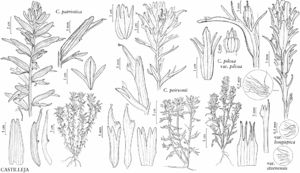Castilleja pilosa var. pilosa
Stems: hairs spreading, ± wavy or curly, soft, (0.4–) 0.8–1.3 (–1.5) mm. Leaf lobes widely spreading to ascending-spreading. Inflorescences (2–) 3.5–15 cm; bracts proximally green, sometimes pinkish, reddish-brown, or light purple with margins or distal portions pale-yellow or whitish, (3–) 5 (–9) -lobed; lobes spreading to erect, medium length to long, arising near to above mid length. Calyces (11–) 14–28 mm; abaxial and adaxial clefts 5–7 mm, 45–50% of calyx length, lateral 5–7 mm, 45–55% of calyx length; lobes narrowly lanceolate. Corolla beaks 3–5 mm; abaxial lip green, sometimes pink or pale-yellow, 3.5–8 mm, 70–100% as long as beak; teeth green, white, pink, buff, or pale-yellow. 2n = 24.
Phenology: Flowering May–Aug.
Habitat: Sagebrush steppes, rocky slopes, ridges, seasonally moist meadows or pools, conifer forests, montane to subalpine.
Elevation: 500–2000(–3500) m.
Distribution
Calif., Nev., Oreg.
Discussion
Variety pilosa is found in sagebrush steppes and communities in the surrounding mountains from northeastern California through much of eastern Oregon, and northwestern Nevada. The inflorescences are almost always pale yellowish white when young and often turn dull reddish purple with age, especially proximally. This variety is sometimes confused with the high-elevation species Castilleja nana; it can usually be distinguished by the absence of blackish patches on the sides of the corolla tube, which are present in C. nana.
Selected References
None.
Lower Taxa
"dm" is not declared as a valid unit of measurement for this property.
